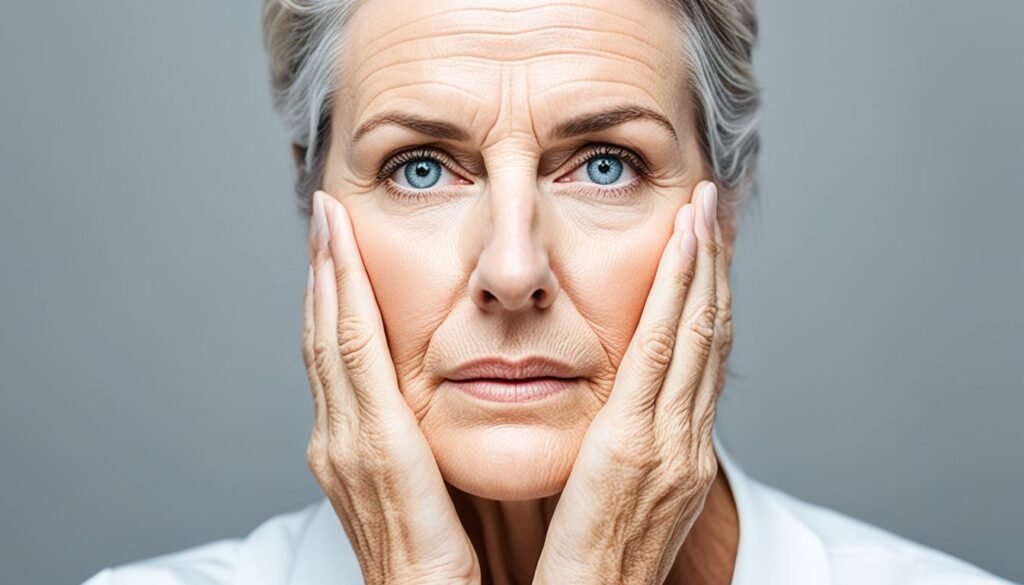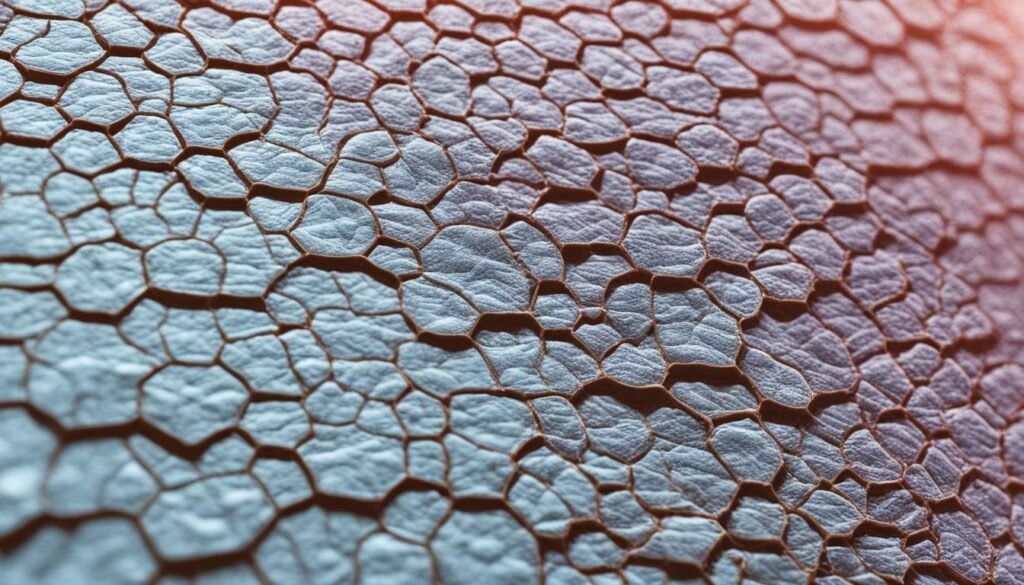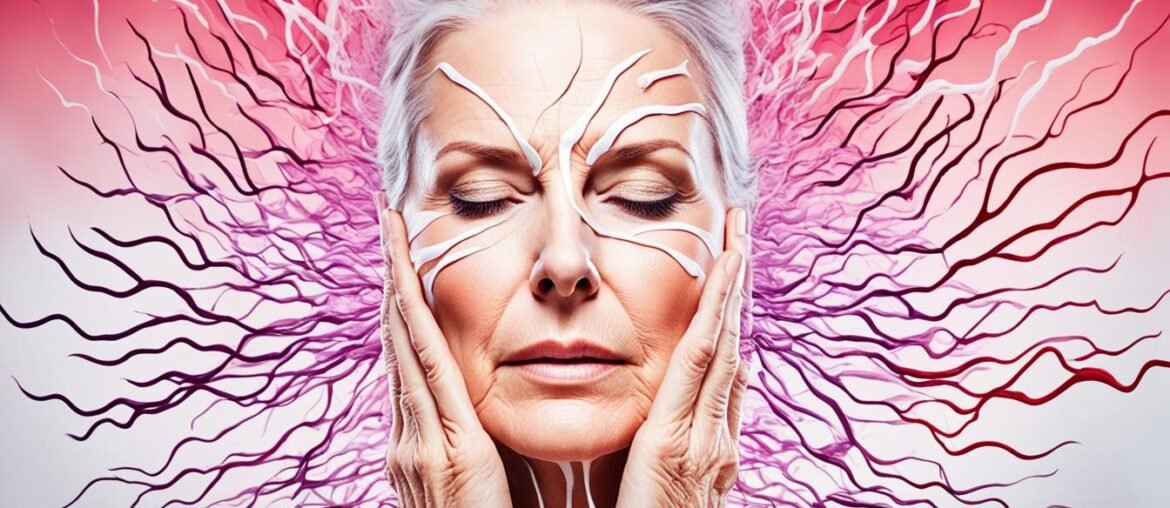Did you know that chronic stress can accelerate the aging process of your skin? It’s true! Stress-induced skin aging is a significant concern that affects many individuals. The hormone cortisol, often referred to as the stress hormone, plays a crucial role in this connection. When the body is under stress, cortisol is released, leading to a cascade of effects that can result in acne breakouts, dryness, wrinkles, and other signs of premature aging.
Understanding the impact of stress and cortisol on skin health is vital for anyone seeking to maintain a youthful and radiant complexion. In this article, I will delve into the relationship between stress and aging skin, explore the effects of cortisol on the skin, and highlight the essential strategies for managing stress to help you keep your skin healthy and vibrant.
Key Takeaways:
- Chronic stress can lead to premature skin aging due to the release of cortisol.
- Cortisol affects the skin by increasing oil production, promoting inflammation, and reducing collagen production.
- Elevated cortisol levels can result in acne breakouts, wrinkles, and other signs of aging.
- Proper stress management techniques, such as exercise and mindfulness practices, can help minimize the impact of stress on the skin.
- Utilizing skincare products rich in antioxidants can provide additional protection against oxidative damage caused by stress.
The Role of Cortisol in Skin Aging
Cortisol, also known as the stress hormone, plays a significant role in the aging process of the skin. When cortisol levels are consistently elevated due to chronic stress, it can lead to increased inflammation, decreased collagen production, and impaired skin barrier function. These effects contribute to the development of wrinkles, fine lines, and other signs of premature aging.
Studies have shown that high cortisol levels can accelerate the breakdown of collagen, a protein responsible for maintaining the skin’s firmness and elasticity. Collagen degradation leads to a loss of skin structure and the formation of wrinkles.
Additionally, cortisol can disrupt the skin’s natural barrier function, making it more vulnerable to external aggressors and moisture loss. This can result in dryness, irritation, and a dull complexion.
Reducing cortisol levels through effective stress management techniques is essential for minimizing its negative impact on the skin. Practices like regular exercise, mindfulness, and getting enough sleep can help regulate cortisol production and improve overall skin health.
Chronic stress and elevated cortisol levels can wreak havoc on the skin, speeding up the aging process. By taking steps to manage stress and reduce cortisol, we can support healthier, more youthful-looking skin.
The Effects of Cortisol on Skin
The effects of cortisol on the skin are multi-faceted and can manifest in various ways:
- Inflammation: Elevated cortisol levels contribute to increased skin inflammation, leading to redness, sensitivity, and a compromised skin barrier.
- Collagen degradation: Cortisol inhibits collagen synthesis, resulting in a decrease in its quantity and quality. This leads to the formation of wrinkles, sagging skin, and a loss of elasticity.
- Skin barrier impairment: Cortisol disrupts the skin’s natural barrier function, causing increased water loss and vulnerability to environmental stressors. This can result in dryness, irritation, and a weakened defense against aging.
- Imbalance in oil production: Elevated cortisol levels can stimulate the production of sebum, leading to oily or acne-prone skin.
Understanding the negative effects of cortisol on the skin highlights the importance of stress management and adopting a skincare routine that addresses these concerns.
| Effects of Cortisol on Skin | How to Combat |
|---|---|
| Inflammation | Implement anti-inflammatory skincare ingredients, such as niacinamide or green tea extract. |
| Collagen degradation | Include collagen-boosting ingredients like vitamin C and retinol in your skincare routine. |
| Skin barrier impairment | Use gentle cleansers, moisturizers, and products with ceramides to strengthen the skin barrier. |
| Imbalance in oil production | Choose non-comedogenic products and incorporate oil-balancing ingredients like salicylic acid. |
Effects of Stress on Skin Health

Chronic stress can have detrimental effects on overall skin health. It disrupts the skin’s natural barrier function, leading to increased sensitivity, dryness, and irritation. Stress also impairs the skin’s ability to repair and regenerate, resulting in slower wound healing and increased vulnerability to infections. Additionally, stress can exacerbate existing skin conditions such as acne, eczema, and psoriasis.
When we are under stress, our bodies release stress hormones such as cortisol, which can contribute to the deterioration of skin health. The stress-induced skin aging process involves various mechanisms, including the disruption of the skin’s natural defense mechanisms, increased inflammation, and impaired collagen production.
The skin’s natural barrier function plays a vital role in protecting against external aggressors and maintaining hydration. However, chronic stress can compromise this barrier, leading to increased water loss, dryness, and a heightened susceptibility to damage. The impaired barrier function also makes it easier for irritants and allergens to penetrate the skin, triggering inflammatory responses and exacerbating skin conditions.
The stress and aging skin connection is further intensified by the negative effects of stress hormones on collagen production. Cortisol, the primary stress hormone, inhibits collagen synthesis, leading to a decrease in the quantity and quality of this crucial protein. Collagen depletion results in the formation of wrinkles, sagging skin, and a loss of overall skin elasticity.
In addition to these visible effects, stress-induced skin aging can also manifest in other ways, such as impaired wound healing and compromised skin regeneration. Chronic stress disrupts the natural healing process of the skin, leading to delayed recovery from injuries and a higher risk of scarring.
Stress and Skin Health: The Impact
Increased Sensitivity: Chronic stress can make the skin more reactive and sensitive to environmental triggers, leading to redness, itching, and discomfort.
Dryness and Irritation: Stress disrupts the skin’s moisture balance, resulting in dryness, flakiness, and a compromised skin barrier, which can lead to further irritation.
Worsening Skin Conditions: Stress can exacerbate existing skin conditions, such as acne, eczema, and psoriasis, making them more difficult to manage and control.
Delayed Healing: Stress impairs the skin’s ability to heal wounds and repair damage, leading to slower healing times and an increased risk of scarring.
“The skin is not just a reflection of what’s happening on the surface but also a reflection of what’s happening within.” – Dr. Whitney Bowe
Managing stress effectively is crucial for maintaining optimal skin health. By reducing stress levels, we can help restore the skin’s natural balance and support its ability to repair and regenerate. Incorporating stress management techniques such as regular exercise, adequate sleep, and mindfulness practices can help lower cortisol levels and promote healthier skin.
| Effects of Stress on Skin Health: | Symptoms: |
|---|---|
| Increased Sensitivity | Redness, itching, discomfort |
| Dryness and Irritation | Dryness, flakiness, compromised skin barrier |
| Worsening Skin Conditions | Acne, eczema, psoriasis flare-ups |
| Delayed Healing | Slower wound healing, increased scarring risk |
It is also important to incorporate skincare routines that address the specific needs of stressed skin. Using gentle and hydrating products can help nourish and soothe the skin, reducing inflammation and promoting a healthier complexion.
When it comes to stress-induced skin aging, taking a holistic approach that focuses on both internal and external factors is key. By managing stress levels and adopting a comprehensive skincare routine, we can minimize the negative effects of stress on our skin and maintain its health and vitality.
The Impact of Cortisol on Collagen Production
Cortisol, a hormone released in response to stress, can have significant effects on the production of collagen in the skin. Collagen is a vital protein that provides the skin with elasticity and firmness, helping it maintain its youthful appearance. However, when cortisol levels are elevated due to chronic stress, the synthesis of collagen can be disrupted.
High levels of cortisol inhibit the production of collagen, leading to a decrease in both its quantity and quality. This can result in the formation of wrinkles, sagging skin, and a loss of overall skin elasticity. The relationship between stress, cortisol, and collagen production highlights the importance of managing stress levels to prevent premature skin aging.
By implementing stress management techniques, such as exercise, meditation, and proper self-care, cortisol levels can be regulated, thereby preserving collagen production. It is crucial to prioritize stress reduction strategies to maintain healthy levels of collagen and promote youthful-looking skin.
A visual representation of the impact of cortisol on collagen production in the skin.
Inflammation and Skin Aging

Chronic stress can have a profound impact on the aging process of the skin, including the development of inflammation. Inflammation plays a significant role in skin aging, as it can damage essential components of the skin such as collagen and elastin fibers, impairing the skin’s natural repair mechanisms.
When the skin experiences inflammation, it becomes more prone to the development of wrinkles, redness, and uneven skin tone. Additionally, chronic inflammation can disrupt the skin’s healthy balance, leading to increased sensitivity and a compromised barrier function.
Inflammation is a key player in the aging process, as it can damage collagen and elastin fibers, impair the skin’s natural repair mechanisms, and lead to the development of wrinkles, redness, and uneven skin tone.
Reducing stress levels and managing its impact on the body can help minimize inflammation and its negative effects on the skin. By adopting stress management techniques, individuals can promote a more youthful and radiant complexion.
The Role of Stress Hormones in Skin Aging
Stress hormones, including cortisol, play a crucial role in the skin aging process. When the body experiences chronic stress, cortisol levels remain elevated, which can contribute to increased inflammation and accelerated aging.
Cortisol not only damages collagen and elastin fibers but also hampers the skin’s ability to produce new collagen, resulting in a loss of elasticity and firmness. This can lead to the formation of wrinkles, sagging skin, and a lacklustre appearance.
By managing stress and cortisol levels, individuals can help preserve the skin’s natural processes, maintain collagen production, and prevent premature skin aging.
Managing stress can help reduce inflammation and minimize its negative impact on the skin, promoting a more youthful and radiant complexion.
List of Key Factors:
- Chronic stress triggers inflammation in the body, including the skin.
- Inflammation damages collagen and elastin fibers, impairing the skin’s natural repair mechanisms.
- Inflammation contributes to the development of wrinkles, redness, and uneven skin tone.
- Managing stress helps reduce inflammation and minimize its negative impact on the skin.
By understanding the relationship between stress, inflammation, and skin aging, individuals can take proactive steps towards maintaining healthy and youthful skin.
| Effects of Chronic Stress on the Skin | Ways to Manage Stress |
|---|---|
| Increased inflammation | Meditation and relaxation techniques |
| Collagen degradation | Regular exercise |
| Impaired skin barrier function | Adequate sleep |
| Accelerated skin aging | Healthy lifestyle choices |
By adopting stress management techniques and incorporating healthy lifestyle choices, individuals can support their skin’s natural defenses and promote a more youthful and vibrant appearance.
Impaired Skin Barrier Function Due to Stress
Chronic stress can have a profound impact on the health and appearance of our skin. One of the key effects of stress on the skin is the disruption of its natural barrier function. The skin’s barrier is responsible for keeping moisture in and harmful external aggressors out. However, when we experience prolonged stress, this barrier can become compromised.
Under normal circumstances, the skin’s barrier is a well-functioning system that locks in moisture, protects against environmental toxins, and maintains optimal hydration levels. However, when stress comes into play, this delicate balance is disrupted. Increased stress levels can lead to increased water loss from the skin, resulting in dryness, dullness, and a compromised ability to protect against external aggressors such as pollution and UV radiation.
The impaired skin barrier function due to stress makes the skin more vulnerable to damage, inflammation, and premature aging. Without the protective barrier, the skin becomes susceptible to environmental irritants, leading to increased sensitivity, redness, and irritation. Additionally, the loss of moisture can contribute to dryness and the appearance of fine lines and wrinkles.
Managing stress and adopting proper skincare routines that support the skin’s barrier function are essential for maintaining a healthy and youthful complexion. By reducing stress levels through practices such as meditation, exercise, and adequate sleep, we can help restore the skin’s natural protective barrier. Additionally, incorporating skincare products that focus on hydration, moisturization, and strengthening the skin’s barrier can further support its overall health and resilience.
It is important to prioritize self-care and stress management not only for our overall well-being but also for the health and appearance of our skin. By taking steps to reduce stress and support the skin’s barrier function, we can enhance its resilience, combat premature aging, and maintain a youthful complexion.
The Role of Antioxidants in Stress Management

Stress can have a profound impact on our bodies, including our skin. It can trigger the production of free radicals, which can cause oxidative damage to our skin cells and accelerate the aging process. However, incorporating antioxidants into our stress management routine can help counteract these effects and promote healthier, more youthful-looking skin.
Antioxidants play a crucial role in neutralizing free radicals and protecting our skin from oxidative stress. They work by donating an electron to stabilize the free radicals, thus preventing them from damaging our skin cells. This can help reduce inflammation, prevent collagen degradation, and improve overall skin health.
There are various ways to incorporate antioxidants into our stress management routine. One effective way is to include antioxidant-rich foods in our diet, such as berries, leafy greens, and nuts. These foods are packed with vitamins A, C, and E, as well as other potent antioxidants, that can help fight oxidative stress and promote skin health.
In addition to a healthy diet, using skincare products that are rich in antioxidants can also provide benefits for stressed skin. Look for products that contain ingredients like green tea extract, vitamin C, and resveratrol. These antioxidants can help protect the skin from environmental stressors, improve cell turnover, and promote a more youthful appearance.
The Power of Green Tea
Green tea is a powerful antioxidant that has been shown to have numerous benefits for the skin. It has anti-inflammatory properties, helps protect against UV damage, and promotes collagen production. Incorporating green tea into your skincare routine can help combat the effects of stress on the skin and promote a healthier complexion.
When it comes to stress management, antioxidants are an essential tool in maintaining healthy and youthful-looking skin. Whether through a nutrient-rich diet or antioxidant-infused skincare products, incorporating these powerful compounds into our daily routine can provide significant benefits for stressed skin.
Stress Management Techniques for Healthier Skin

Reducing stress is crucial in maintaining healthier and more youthful skin. By implementing various stress management techniques, you can minimize the negative impact of stress-induced skin aging and the effects of cortisol on the skin. Here are some effective strategies:
1. Regular Exercise
Engaging in regular physical activity has been shown to lower cortisol levels and promote overall well-being. Exercise stimulates the release of endorphins, which are natural mood boosters. This helps reduce stress and promote healthier skin.
2. Adequate Sleep
Getting enough quality sleep is essential in managing stress and supporting skin health. During sleep, the body repairs and rejuvenates, allowing for optimal cell turnover and collagen production. Aim for 7-9 hours of uninterrupted sleep each night.
3. Mindfulness Practices
Practicing mindfulness techniques such as meditation, deep breathing, and yoga can help calm the mind and lower cortisol levels. These techniques promote relaxation and improve stress resilience, leading to healthier skin.
4. Skincare Routine for Stressed Skin
Implementing a skincare routine that specifically addresses the needs of stressed skin is vital. Look for products that contain hydrating and soothing ingredients, such as hyaluronic acid, aloe vera, and chamomile. These ingredients help restore moisture and calm inflammation, counteracting the negative effects of stress on the skin.
5. Stress-Reducing Supplements
Incorporating stress-reducing supplements into your daily routine can support your body’s response to stress and promote skin health. Adaptogenic herbs like ashwagandha and holy basil, as well as omega-3 fatty acids, have been shown to help manage stress and reduce the effects of cortisol on the skin.
By integrating these stress management techniques into your lifestyle and skincare routine, you can minimize the impact of stress-induced skin aging and cortisol on your skin. Remember, taking care of your overall well-being is just as important for maintaining healthy, radiant skin as any skincare product.
Comparison of Stress Management Techniques
| Stress Management Technique | Benefits |
|---|---|
| Regular Exercise | Reduces cortisol levels, promotes endorphin release, improves skin health |
| Adequate Sleep | Supports stress recovery, enhances cell turnover, increases collagen production |
| Mindfulness Practices | Calms the mind, lowers cortisol levels, improves stress resilience |
| Skincare Routine for Stressed Skin | Restores moisture, soothes inflammation, counteracts stress-induced skin damage |
| Stress-Reducing Supplements | Supports stress response, promotes skin health, reduces cortisol impact |
Implementing a combination of these stress management techniques can help you achieve healthier, more resilient skin. Remember to tailor your approach to your individual needs and consult with a healthcare professional before starting any new exercise or supplement regimen.
The Link Between Emotional Well-being and Skin Health

Emotional well-being and skin health are profoundly connected. When we prioritize self-care, engage in activities that promote relaxation and happiness, and maintain positive relationships, our overall stress levels decrease, ultimately benefiting our skin and reducing the risk of premature aging.
Chronic emotional stress can exacerbate existing skin conditions and accelerate the aging process. The release of stress hormones, including cortisol, can have a detrimental effect on our skin, leading to increased inflammation, collagen degradation, and impaired skin barrier function.
Conversely, maintaining a positive emotional state promotes skin health and a more youthful appearance. Emotional well-being supports the natural healing process of the skin, enhances its resilience, and helps maintain its overall integrity.
By taking deliberate steps to manage and reduce emotional stress, we can significantly impact the health and appearance of our skin. Engaging in stress-reducing activities such as meditation, yoga, or spending time in nature can help balance cortisol levels and promote a more harmonious state of mind.
“Nurturing positive emotions is not only good for our mental well-being, but it also has a profound effect on our physical health, including our skin,” says Dr. Amanda Johnson, a dermatologist at SkinCare Clinic.
Furthermore, establishing a strong support system and seeking professional help when needed can contribute to emotional well-being and positively impact our skin health. Cultivating healthy coping mechanisms, such as practicing gratitude, journaling, or engaging in creative outlets, can also enhance emotional resilience and skin health.
Remember, taking care of our emotional well-being is equally important as taking care of our skin. When we prioritize our mental health, we create a positive ripple effect that extends to all aspects of our lives, including the health and vitality of our skin.
| Effects of Emotional Well-being on Skin Health | Effects of Emotional Stress on Skin Health |
|---|---|
|
|
Emotional well-being is a key component of maintaining healthy and vibrant skin. By incorporating stress-management techniques and prioritizing self-care, we can achieve a balance between our emotional state and skin health, resulting in a radiant and youthful complexion.
Conclusion
The connection between stress, cortisol, and skin aging is well-established. Chronic stress can disrupt the skin’s natural processes, leading to increased oil production, inflammation, collagen degradation, and impaired skin barrier function. These effects contribute to the development of acne, wrinkles, dryness, and other signs of premature aging.
Managing stress through various techniques, such as exercise, relaxation practices, and proper skincare, is crucial for maintaining healthier, more youthful skin. By reducing stress and cortisol levels, we can promote optimal skin health and a more radiant complexion.
It is important to prioritize self-care and adopt stress management strategies that work for each individual. Taking steps to reduce stress not only benefits the mind and body, but also contributes to the overall health and appearance of the skin.
FAQ
What is the connection between stress, cortisol, and skin aging?
Stress can have a significant impact on the aging of the skin, particularly through the hormone cortisol. When the body is under stress, it releases cortisol, which can lead to increased oil production, inflammation, and a decrease in collagen production. These effects can result in acne breakouts, dryness, wrinkles, and other signs of premature aging. Managing stress is crucial for maintaining healthier, more youthful skin.
How does cortisol contribute to skin aging?
Cortisol, also known as the stress hormone, plays a significant role in the aging process of the skin. When cortisol levels are consistently elevated due to chronic stress, it can lead to increased inflammation, decreased collagen production, and impaired skin barrier function. These effects contribute to the development of wrinkles, fine lines, and other signs of premature aging. Proper stress management techniques can help reduce cortisol levels and minimize its negative impact on the skin.
What are the effects of stress on skin health?
Chronic stress can have detrimental effects on overall skin health. It can disrupt the skin’s natural barrier function, leading to increased sensitivity, dryness, and irritation. Stress can also impair the skin’s ability to repair and regenerate, resulting in slower healing of wounds and increased vulnerability to infections. Additionally, stress can exacerbate existing skin conditions such as acne, eczema, and psoriasis. Managing stress effectively is crucial for maintaining optimal skin health.
How does cortisol affect collagen production?
Cortisol has been shown to inhibit the production of collagen, a protein that is essential for maintaining the elasticity and firmness of the skin. High cortisol levels can disrupt the synthesis of collagen, leading to a decrease in its quantity and quality. This can result in the formation of wrinkles, sagging skin, and a loss of overall skin elasticity. Managing stress and cortisol levels is crucial for preserving collagen production and preventing premature skin aging.
What is the relationship between inflammation and skin aging?
Chronic stress can trigger inflammation in the body, including the skin. Inflammation is a key player in the aging process, as it can damage collagen and elastin fibers, impair the skin’s natural repair mechanisms, and lead to the development of wrinkles, redness, and uneven skin tone. Managing stress can help reduce inflammation and minimize its negative impact on the skin, promoting a more youthful and radiant complexion.
How does stress affect the skin’s natural barrier function?
Chronic stress can disrupt the skin’s natural barrier function, leading to increased water loss, dryness, and a compromised ability to protect against external aggressors. When the skin’s barrier function is impaired, it becomes more susceptible to damage, inflammation, and premature aging. Managing stress and practicing proper skincare routines that support the skin’s barrier function are essential for maintaining a healthy and youthful complexion.
What is the role of antioxidants in stress management?
Stress can increase the production of free radicals in the body, which can cause oxidative damage to the skin cells. Antioxidants play a crucial role in neutralizing these free radicals and protecting the skin from oxidative stress. Incorporating antioxidant-rich foods and skincare products into your routine can help combat the negative effects of stress on the skin and promote a more youthful appearance.
What are some stress management techniques for healthier skin?
There are various stress management techniques that can help reduce the impact of stress on the skin. Regular exercise, adequate sleep, and mindfulness practices such as meditation and deep breathing can help lower cortisol levels and promote a more balanced stress response. Additionally, incorporating a skincare routine that addresses the specific needs of stressed skin, such as hydrating and soothing products, can help support the skin’s natural defenses.
How does emotional well-being impact skin health?
Emotional well-being and skin health are interconnected. When we prioritize self-care, engage in activities that promote relaxation and happiness, and maintain positive relationships, our overall stress levels decrease, benefiting our skin. Emotional stress can exacerbate skin conditions and accelerate the aging process, while a positive emotional state promotes skin health and a more youthful appearance. Taking steps to manage and reduce emotional stress can have a significant impact on the health and appearance of the skin.
What is the summary of the stress, cortisol, and skin aging connection?
The connection between stress, cortisol, and skin aging is well-established. Chronic stress can disrupt the skin’s natural processes, leading to increased oil production, inflammation, collagen degradation, and impaired skin barrier function. These effects contribute to the development of acne, wrinkles, dryness, and other signs of premature aging. Managing stress through various techniques, such as exercise, relaxation practices, and proper skincare, is crucial for maintaining healthier, more youthful skin. By reducing stress and cortisol levels, we can promote optimal skin health and a more radiant complexion.




